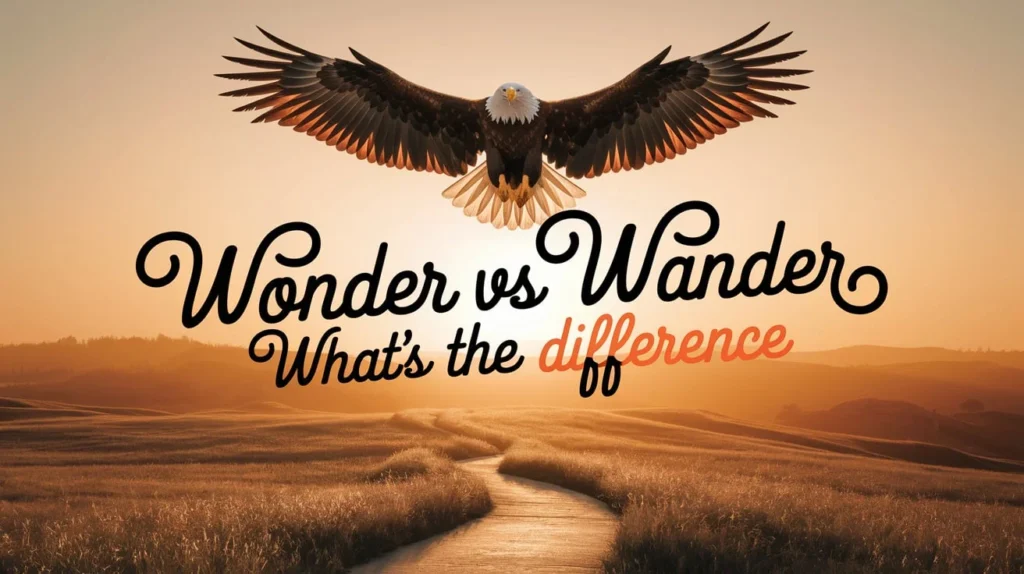Understanding the difference between the words “wonder” and “wander” can be surprisingly tricky, especially given how similar they sound. Both words have distinct meanings, but their usage often confuses even native English speakers.
In this article, we’ll clear up the confusion by breaking down each word, explaining their definitions, and providing useful examples. Whether you’re a writer, a learner of English, or just someone who enjoys mastering language, knowing how to properly use these words will enhance your communication skills. By the end of this guide, you’ll confidently know when to use “wonder” and when to use “wander.”
Definitions and Core Meanings
What Does “Wonder” Mean?
The word “wonder” refers to a feeling of amazement, curiosity, or awe in response to something extraordinary or unfamiliar. It can also be used as a verb, expressing the act of thinking or feeling curious about something. As a noun, wonder often describes an event or thing that causes someone to feel awe, amazement, or deep thought.
- As a noun:
- “The wonder of the Northern Lights left us speechless.”
- “Her kindness was a true wonder to behold.”
- “The wonder of the Northern Lights left us speechless.”
- As a verb:
- “I wonder what life would be like on Mars.”
- “He couldn’t help but wonder if she was telling the truth.”
- “I wonder what life would be like on Mars.”
In both cases, wonder represents an emotional response that connects with our sense of awe and curiosity. It involves asking questions or contemplating something that sparks fascination.
What Does “Wander” Mean?
In contrast, “wander” means to move aimlessly, often without a particular direction or goal in mind. It implies that the person is not focused or is casually drifting about. Whether physically wandering from place to place, or mentally drifting without focus, wander highlights a lack of intent or purpose.
- As a verb:
- “After hours of walking, he started to wander through the quiet streets.”
- “Her thoughts began to wander during the meeting.”
- “After hours of walking, he started to wander through the quiet streets.”
- Related phrases:
- Wander off – “The child wandered off while playing in the park.”
- Wander around – “We decided to wander around the city, exploring new places.”
- Wander off – “The child wandered off while playing in the park.”
In summary, wander is all about meandering or drifting without a clear goal or destination, either physically or mentally.
Key Differences Between Wonder and Wander
While wonder and wander may look and sound similar, their meanings are worlds apart. Here’s a quick breakdown of the key differences:
| Feature | Wonder | Wander |
| Meaning | A feeling of amazement or curiosity. | To move aimlessly without a fixed destination. |
| Part of Speech | Noun and verb. | Verb. |
| Pronunciation | /ˈwʌn.dɚ/ (wuhn-der) | /ˈwɑːn.dɚ/ (wahn-der) |
| Example as Noun | “The wonder of the universe never ceases.” | – |
| Example as Verb | “I wonder if it will rain tomorrow.” | “She began to wander through the forest.” |
As you can see from the chart, wonder involves emotions like curiosity and amazement, while wander describes aimless movement. So, wonder involves your mind or feelings, while wander describes your body or actions.
Common Mistakes and Confusions
A common mistake people make is confusing wonder and wander simply because they sound so alike. Here are some examples of incorrect usage and how to fix them:
- Incorrect: “I love to wonder around the city.”
Corrected: “I love to wander around the city.” - Incorrect: “I can’t help but wander what’s inside.”
Corrected: “I can’t help but wonder what’s inside.”
Another common mistake is the mix-up of verb tenses. While wonder can function both as a verb and a noun, wander is only a verb, which can sometimes cause confusion. The correct usage depends on the meaning you intend to convey.
Usage in Different Contexts
Understanding how wonder and wander are used in everyday language is essential for mastering them. Let’s explore a few scenarios where each word fits perfectly.
A. Wonder in Everyday Language
We often use wonder when expressing curiosity or astonishment. It’s linked to emotions and thinking.
- Expressing curiosity:
- “I wonder if the weather will be nice tomorrow.”
- “Do you ever wonder what the future holds for us?”
- “I wonder if the weather will be nice tomorrow.”
- Describing amazement or awe:
- “The Grand Canyon filled me with wonder.”
- “Her singing voice was a true wonder.”
- “The Grand Canyon filled me with wonder.”
B. Wander in Everyday Language
On the other hand, wander is mostly used to describe a lack of direction or moving without a fixed goal. It can be both literal and figurative.
- Physical movement:
- “We decided to wander through the museum and see what catches our eye.”
- “After dinner, they took a wander around the neighborhood to enjoy the evening.”
- “We decided to wander through the museum and see what catches our eye.”
- Figurative movement (thoughts):
- “I caught myself daydreaming as my mind started to wander.”
- “His thoughts would often wander when he wasn’t fully engaged.”
- “I caught myself daydreaming as my mind started to wander.”
Pronunciation Breakdown
The subtle difference in pronunciation between wonder and wander is crucial to avoiding confusion.
- Wonder: Pronounced /ˈwʌn.dɚ/ (wuhn-der). The vowel sound here is short, as in “cup”.
- Wander: Pronounced /ˈwɑːn.dɚ/ (wahn-der). The vowel sound is longer, like the “ah” sound in “father”.
To remember this, think of “wander” as a more open sound, like you’re taking a deep breath while saying it, whereas “wonder” is more closed and quicker.
Mnemonics and Memory Aids
If you’re having trouble remembering which word to use, a few mnemonics can help:
- For wonder: Think of the word “awe” — when you are filled with wonder, you’re in awe of something.
- For wander: The letter A in “aimless” can help remind you that wandering is aimless.
Visualizing wonder as a lightbulb moment—a flash of curiosity—and wander as footprints leading nowhere can also help you keep the meanings straight.
Examples from Literature, Pop Culture, and Quotes
Famous writers have beautifully used both words to express complex emotions and ideas. Here are some memorable quotes:
- Wonder:
- “We keep moving forward, opening new doors, and doing new things, because we’re curious and curiosity keeps leading us down new paths.” – Walt Disney
- “The wonder of the universe is something we will never fully comprehend.” – Carl Sagan
- “We keep moving forward, opening new doors, and doing new things, because we’re curious and curiosity keeps leading us down new paths.” – Walt Disney
- Wander:
- “Not all those who wander are lost.” – J.R.R. Tolkien (from The Lord of the Rings)
- “I am always wandering around in the forest, in search of something.” – Unknown
- “Not all those who wander are lost.” – J.R.R. Tolkien (from The Lord of the Rings)
These examples from popular culture and literature emphasize the different contexts in which wonder and wander are used, each evoking unique feelings and ideas.
Final Summary and Quick Reference Guide
Let’s wrap up the key differences between wonder and wander with this quick recap:
- Wonder: A feeling of awe, curiosity, or amazement; can be a noun or verb.
- Wander: Moving aimlessly or without direction; only a verb.
Keep these distinctions in mind, and you’ll be well on your way to mastering the proper usage of these two similar-sounding words.
FAQs: Wonder vs. Wander
1. What is the main difference between “wonder” and “wander”?
The word “wonder” refers to a feeling of curiosity, amazement, or awe, while “wander” means to move aimlessly or without direction.
2. Can “wonder” and “wander” be used interchangeably?
No, they have different meanings. Wonder relates to thoughts and feelings, while wander describes physical or mental movement without a clear direction.
3. How do you pronounce “wonder” and “wander” correctly?
- Wonder is pronounced /ˈwʌn.dɚ/ (wuhn-der), with a short “u” sound like in “cup.”
- Wander is pronounced /ˈwɑːn.dɚ/ (wahn-der), with a longer “ah” sound like in “father.”
4. Can “wonder” be used as both a noun and a verb?
Yes, wonder can be both a noun and a verb.
- As a noun: “The Northern Lights are a true wonder of nature.”
- As a verb: “I wonder what the future holds for us.”
5. Is “wander” ever used as a noun?
Rarely. Wander is primarily used as a verb, but some informal phrases, like “go for a wander,” use it as a noun.
Conclusion
In conclusion, while wonder and wander may sound alike, they have very distinct meanings and uses. By understanding the core definitions and applying the right one in context, you can avoid common mistakes and speak with greater precision.
Whether you’re exploring the awe of nature or wandering through a new city, knowing the difference between these two words will make your language more accurate and expressive. If you’ve found this article helpful, feel free to share it with others who may benefit from a little clarification on these commonly confused words.

Mira Olive is a passionate spiritual writer dedicated to exploring the profound meanings behind angel numbers. With a background in numerology and a deep connection to the spiritual realm, Mira crafts insightful articles that guide readers on their journeys of self-discovery and personal growth.



